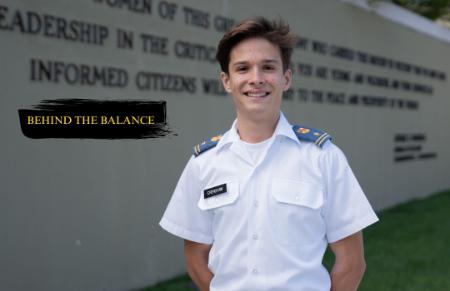Behind the Balance: Colin Crenshaw ’27 — Keydet Cross Country
Virginia Military Institute’s cadet-athletes have to juggle cadet life, heavy academic course loads, and their NCAA Division I sport. Committed to both academic and athletic pursuits, balancing their rigorous schedule in both sports and school requires a certain level of commitment and discipline. Behind the Balance is a series that focuses on those cadet-athletes and how they handle the hurdles of the day-to-day.
LEXINGTON, Va. Oct. 27, 2025 — Uncertainty after high school is normal and something Colin Crenshaw ’27 faced upon graduation. It’s one of the reasons he decided to attend Virginia Military Institute.
“I didn't really know what I wanted to do after high school, but I knew if I came here, there would be lots of doors that would be open,” he admitted. 
The chemistry major also had the opportunity to run cross country and track at VMI, something he fell in love with at a young age.
“I started running cross country in middle school because my mom convinced me to, because she told me I'd get faster for basketball,” he said. “I ended up not being that good at basketball. I fell in love with running. I had a good coach when I first started, and he kind of helped me fall in love with the sport and just pushed me to see how good I could be.”
He likes how cross country makes him more accountable.
“I like that it’s all on me,” he commented. “I don’t have to rely on other people. If I do bad, it’s on me. I think it really tests what you're made of when you're out there by yourself.”
The 2nd Class cadet has a heavy load this semester with 19.5 credit hours.
“Especially here at VMI, there are not a lot of moments where you get to sit back and think,” Crenshaw commented. “I use running to do that.”
Cadet-athletes at VMI not only have their responsibilities with their selected sport but cadet duties on top of that. Cadets are also required to take physical fitness classes twice a week, participate in ROTC all four years, prepare for room and uniform inspections, practice for parade, guard duty, and more.
He’s up before 6 a.m. most days for morning runs. His weekly mileage is between 55 and 60 miles. He’s then in class from 8 a.m. until 3:30 p.m., then he’s off to a 4 p.m. practice.
“I just take it one thing at a time and try not to get overwhelmed,” he said. “I know it's just going to prepare me well for the future.”
Crenshaw said he tries to fit in schoolwork between classes, so he’s not staying up late to finish assignments.
The workload he has at VMI — with academics, athletics, and cadet responsibilities — will help him later in life. Something he is looking to pursue after graduating is attending medical school. Crenshaw is currently a cadet EMT. -450x300.jpg)
“I think the biggest thing is time management. That's something I really learned here that I didn't have to focus on before,” he stated. “I also think VMI teaches you that you’ve got to be doing what you're supposed to be doing. I think that just that discipline will help me in the future.”
He tries to take victories where he can and start with the small things.
“One thing I like to do when I'm working is if I have something small or not that significant, that's not going to take me very long, I like to do that thing first, so I can get one thing done,” he explained. "Rather than trying to do an overwhelming project first.”
As a cadet EMT, Crenshaw is able to pick and choose what events he’s able to cover. It all has to fit into his sports and academic schedule.
“I always knew that I wanted to do something where I actually made a difference and helped people,” he said. “I didn't want to just sit behind a desk and click around in Excel files. That's something I've always known about myself.”
The busyness of life at VMI is something Crenshaw enjoys and thrives on.
“That's the one reason I thought I would do well here,” he said. “I don't like sitting around being bored. That's when I get myself into trouble. It's not good for me to be bored.”
Laura Peters Shapiro
Communications & Marketing
VIRGINIA MILITARY INSTITUTE
.svg)
.png)